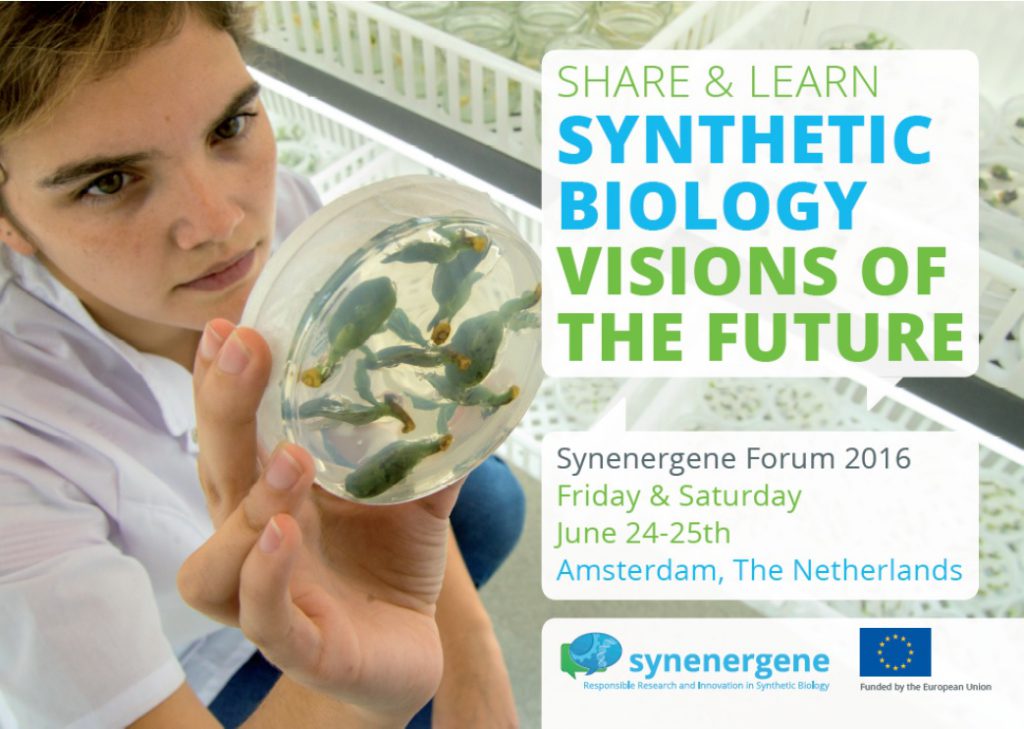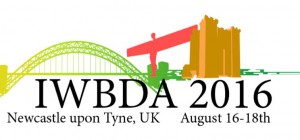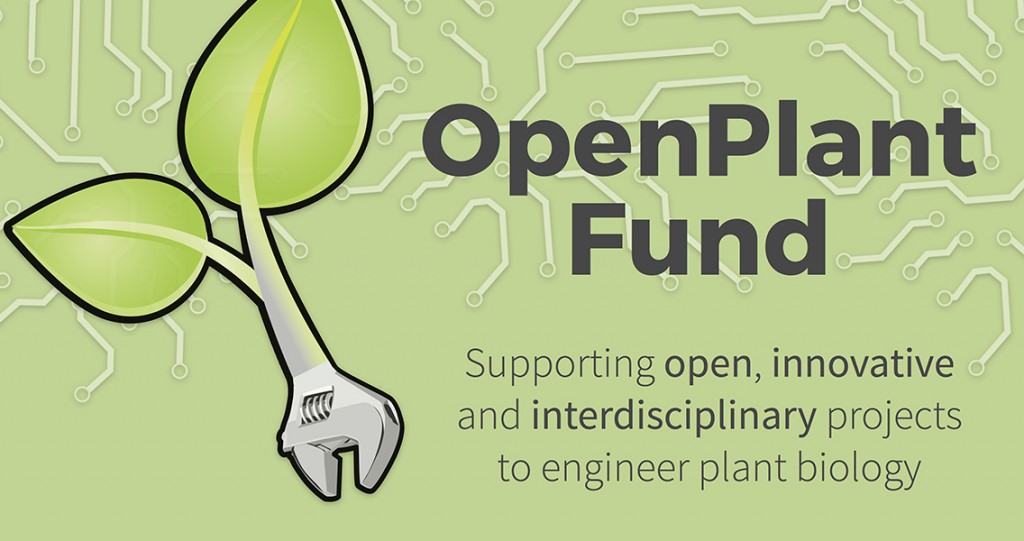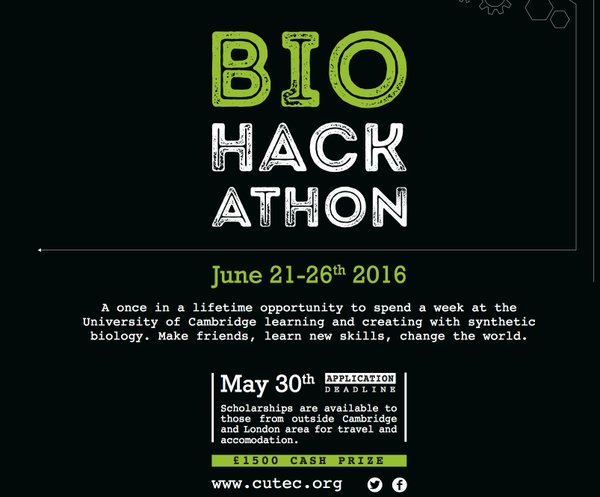 With support from the University of Cambridge SynBio Fund, CUTEC is hosting the UK’s first ever bio-focused “hackathon” in the University of Cambridge. Interdisciplinary teams will take on some of the greatest challenges facing biology.
With support from the University of Cambridge SynBio Fund, CUTEC is hosting the UK’s first ever bio-focused “hackathon” in the University of Cambridge. Interdisciplinary teams will take on some of the greatest challenges facing biology.
This event is about putting together diverse teams to tackle a unique biological problem. If you are a scientist (from ANY discipline), an artist, an economist or have any unique experience and set of skills we want to hear from you! You will spend four days in a University synthetic biology lab where you will have access to hardware, software and biology prototyping tools. The challenge will be revealed to our teams on Tuesday. The final day of the competition will be a pitch at our annual Technology Ventures Conference with over 300 investors, VCs, startups, academics and students. Judges from industry will decide on the most novel solutions. We also will offer the most commercial solution as much help as we can to take it to the next stage. The winning team gets a £1500 cash prize!
The event will run from Tuesday 21st June 6pm to Saturday 25th June 12am. Solutions will be judged on innovative nature and commercial viability. Teams will present their solutions on stage at CUTEC’s flagship Technology Ventures Conference (TVC) in front of investors, academics, students, and incubators.
Individuals who are interested in taking part will apply via the website (www . biohackathon . co . uk) application deadline May 30th) and teams of 3-5 will be assembled. A well-rounded group of researchers from different disciplines is strongly encouraged. Anyone in the UK can apply individually (team assembled by our committee) or as a team. Scholarships are available to those from outside the Cambridge/London area to cover accommodation and travel.
A £1500 cash prize is awarded to the winning team, as well as support to commercialise your ideas through in-kind funding.
In your team you will be introduced to the challenge by an expert in the field then led through a brainstorming session. You will then have four days to refine your solution before presenting to a panel of judges from industry, government, start-ups and academia for feedback on the feasibility of your solution. Winning teams will present their solution on stage at the TVC on June 25th.
Who should apply?
Undergraduates and Post-graduates at any UK University, school, company or otherwise. All fields are encouraged we need: Biology, Chemistry, Physics, Engineering, Computing, Business, International Relations, Anthropology, Art, Design, Marketing, and others! Whatever you do, if you are interested in working on a diverse team to create sustainable solutions to real problems, apply!
Applicants may be individuals. If there is a partner that you would prefer to be placed on a team with, please state this in your application. We want to encourage participants to meet and work with new people but if you already have a team then you may do so but applicants may not apply in teams of more than 5 people.
Why should I apply?
Do you want to challenge yourself intellectually in a collaborative environment?
Do you want to meet new friends and potential future work/research partners?
Are you interested in entrepreneurship but don’t have an idea or a team and just don’t know where to start?
This challenge will foster a community of like-minded researchers and entrepreneurs who want to create a better world. The main focus is solving a problem together; however, if a suitable technology is developed during the project, CUTEC will provide resources for the team to turn that idea into a start-up venture. Our panel of judges providing feedback at the end of the event and who attend our Technology Venture Conference are always looking for bright, fresh talent to enhance their businesses, labs, and initiatives.
How do I apply?
Application forms will be available on our website: www . biohackathon . co . uk
Scholarships
A number of scholarships are available to individuals and teams to cover costs of travel, housing and expenses. Teams outside the Cambridge/London area will be given preference. Please indicate if you can approach other sponsors (societies, university department or other) to help support expenses.
We thank the Synthetic Biology Strategic Research Initiative of the University of Cambridge for funding.
When/Where will it occur?
Applications are due midnight May 30th. Teams will be announced on June 1st.
Entries are accepted either by teams or individuals and assembled into teams by the committee.
The event will run from Tuesday 21st June 6pm to Saturday 25th June 12am in the Department of Plant Sciences University of Cambridge. Judging will occur and presentations awarded at the annual Technology Ventures Conference (TVC) where teams will have the opportunity to pitch and present their solutions.
Enter!
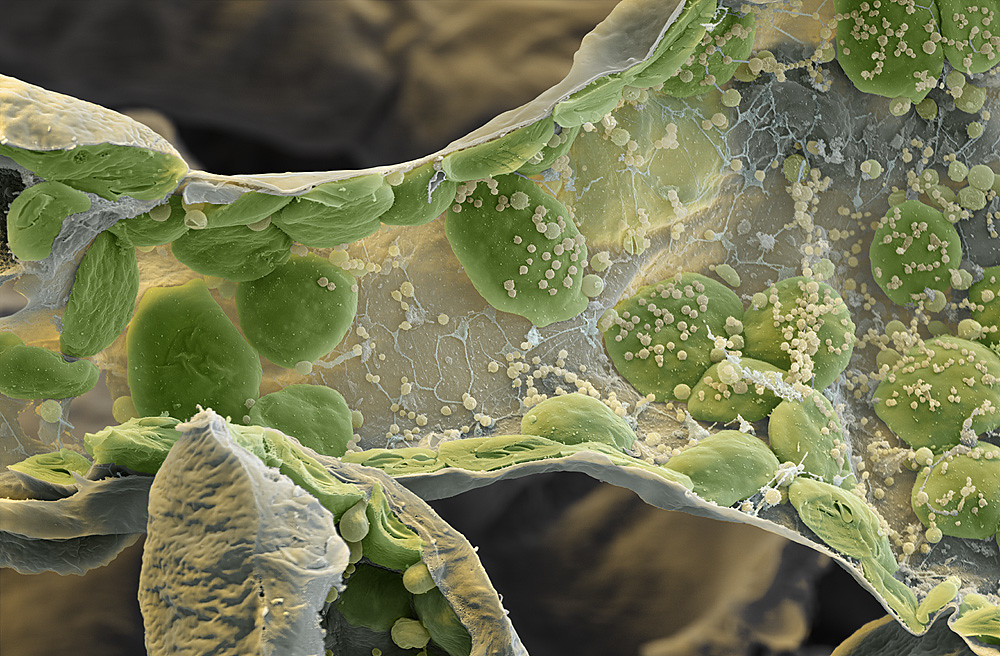

![[Closes 24 Nov 2107] Apply now to the OpenPlant Fund!](https://images.squarespace-cdn.com/content/v1/54a6bdb7e4b08424e69c93a1/1509564315902-TUO4I6QRWI9TT8UGSIAJ/OpenPlantTwitter_400x400+%281%29.jpg)

![[Closes 7 Mar 2017] OpenPlant Research Associate (Haseloff Lab)](https://images.squarespace-cdn.com/content/v1/54a6bdb7e4b08424e69c93a1/1486552818859-FH76MCA8SMFU93WB85RX/OpenPlantTwitter_400x400.jpg)







